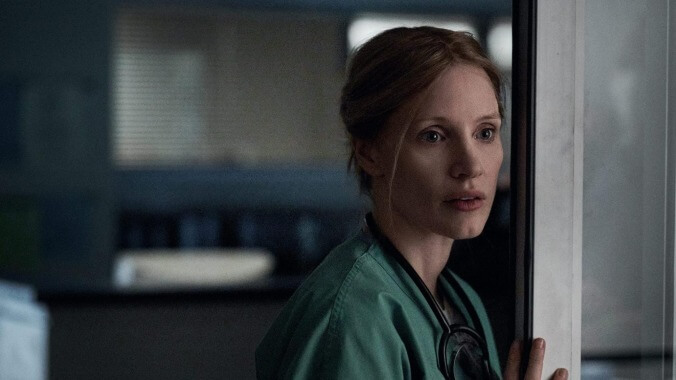In The Good Nurse, Jessica Chastain fights Eddie Redmayne to do no harm
Director Tobias Lindholm's stylish thriller not only examines a real-life serial killer and the nurse who helped stop him but the broken system that enabled him

From A Hijacking to A War, filmmaker Tobias Lindholm has demonstrated an assured, skillful sense of vision, tone, and meticulous character design. His fourth directorial feature (his first in English), The Good Nurse, does the same while delivering an ingeniously subtle, precisely crafted nail-biter. He and screenwriter Krysty Wilson-Cairns (1917) refreshingly re-center author Charles Graeber’s non-fiction novel, The Good Nurse: A True Story Of Medicine, Madness And Murder, not on its eponymous perpetrator, but on one of the informants who helped bring him to justice: a stressed single mother who suspects her trusted colleague has been intentionally killing patients. That shift gives the mystery a dynamic, cinematic resonance—one that expands the real-life tale to scrutinize a healthcare system that can allow bad practices to go unchecked for years.
Amy (Jessica Chastain) is fairly new, working tough night shifts as an ICU nurse, and battling ailments of her own. She’s in desperate need of a heart transplant, but hasn’t accrued enough time for her health insurance to kick in. She’s also financially and emotionally stretched, as her wages are low and she has little time to spend with her two cute-as-buttons daughters at home. They too are starting to feel the pangs of motherly neglect, acting out at their kindly babysitter. The pressure to make ends meet and keep up the demanding pace is at an all-time high.
Life changes for Amy, however, once Charlie (Eddie Redmayne) is hired. He comes highly recommended and has extensive medical knowledge, in addition to a tender bedside manner. Clean-cut, friendly and unassuming, he ingratiates himself into Amy’s life, helping her maintain her well-being, slipping her heart medication on the sly, and cozying up to her daughters. But a patient’s unexplained death sends a red flag up the administrative chain, eventually landing in front of Detectives Braun (Noah Emmerich) and Baldwin (Nnamdi Asomugha). As the investigators face a tangle of bureaucratic red tape and obstacles, many deliberately placed by the hospital’s slippery risk officer (Kim Dixon), Amy emerges as key to their case.
Part of what makes the ensuing suspense percolate perfectly is how the filmmakers construct characters, their conundrums, and conflicts. The way they set up Charlie’s sociopathic denial is subtle and sinister. They drop tiny breadcrumbs for the audience to follow when it comes to his clouded past. His confessions to Amy range from an accusing ex-wife who forbade him to see his kids to a workplace argument that led to a trumped-up complaint. He admits these things with casual candor as if attempting to stir sympathy, but it’s clear he’s telling her half-truths to suit a new narrative he’s spinning, omitting pertinent details as to what actually happened.
 Keep scrolling for more great stories.
Keep scrolling for more great stories.
